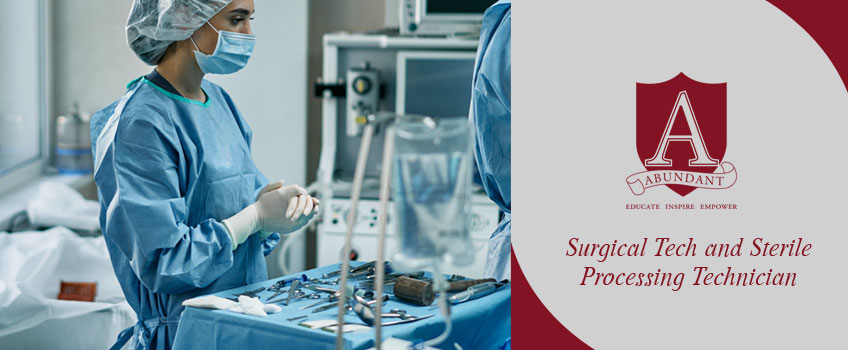
Surgical Technologist
Average Salary $54,420
Job Outlook Excellent
Surgical technologists are members of operating room teams, which include the surgeon(s), anesthesiologist and circulating nurse. Surgical technologists work under the delegatory authority and supervision of the surgeon unless prohibited by state law or hospital policy.
Surgical technologists primarily fulfill the first scrub role. Before an operation, they help prepare the operating room by setting up sterile surgical instruments, equipment and supplies, such as drapes, gowns, gloves, suction tubing, and receiving solutions and medications from the circulator. Surgical technologists assemble the sterile equipment, check to ensure it is all working properly and adjust as necessary.
They assist the surgeon with putting on his/her gown and gloves, as well as assisting the surgeon in placing the sterile drapes on the patient to create the sterile field.
During the surgical procedure, the surgical technologist is responsible for anticipating the needs of the surgeon by passing instruments and providing needed supplies such as sponges, performing counts of the sponge, sharps, and instruments, providing solutions and medications to the surgeon, receiving tissue specimens to be passed off to the circulator and ensuring there are no breaks in sterile technique in order to prevent the patient from acquiring a surgical site infection.
Surgical technologists may fulfill the assistant circulator role based on state law and/or hospital policy. In this role, a technologist assists in transporting patients to the operating room helps position the patient on the operating table and prepares the patient for surgery by performing the skin prep of the incision site(s). During the procedure, the surgical technologist will assist with obtaining additional supplies that the first scrub surgical technologist needs, such as sponges or suture; assist with counts; replace full suction containers; provide sterile dressings at the end of the procedure; and assist with moving the patient from the operating room table to the stretcher for transport to the recovery room.
When not in the operating room, surgical technologists work in clean, well-lighted, cool environments. In the operating room, however, it can become warm under the surgical lights when wearing the sterile gown and gloves. Technologists and other members of the surgical team must stand for long periods and remain alert during operations. At times they may be exposed to communicable diseases and unpleasant sights, odors and materials.
The surgical technologist may have to “pull” emergency call with the other members of the surgical team. If there is an emergency like a car accident or a pregnant mother requiring a Cesarean section, team members on call must come in, no matter what time of the day or night.
Academic Requirements
Most programs do not require more than a high school education for program entrance, but many do require applicants to have taken and passed prerequisite courses, including anatomy and physiology, medical terminology, and microbiology.
Central Service/Sterile Processing Technician
Average Salary $44,000
Years Higher Education 1 – 2
Job Outlook Excellent
central service technician is a medical professional who prevents infections by sterilizing, cleaning, processing, assembling, storing, and distributing medical supplies in a health care facility.
By using their knowledge on the principles of sterilization and sterile processing, central service technicians must disassemble, clean, and disinfect medical tools using both manual and mechanical techniques.
They must conduct inventories and stock medical disposable goods in storage areas. Central service technicians must also assist with the orientation of new personnel who will perform essential duties of sterile processing as defined by the department.
Central Service /Sterile Processing Technician Job Description
Perhaps the hardest question to answer when deciding on a career as a central service technician is “should I become a central service technician?” You might find this info to be helpful. When compared to other jobs, central service technician careers are projected to have a growth rate described as “as fast as average” at 4% from 2018 through 2028. This is in accordance with the Bureau of Labor Statistics. What’s more, is that the projected number of opportunities that are predicted to become available for a central service technician by 2028 is 7,900.
Central service technicians average about $16.91 an hour, which makes the central service technician annual salary $35,167. Additionally, central service technicians are known to earn anywhere from $27,000 to $44,000 a year. This means that the top-earning central service technicians make $15,000 more than the lowest earning ones.
As is the case with most jobs, it takes work to become a central service technician. Sometimes people change their minds about their career after working in the profession. That’s why we looked into some other professions that might help you find your next opportunity. These professions include a technician, service manager/senior technician, sterile processing technician, and field technician.
Program Description
This is offered as a dual program It is designed to prepare the student with the necessary knowledge and skills needed to gain employment as an OR Tech, Surgical Technologist or Sterile Processing Technician. Students will study all aspects of surgery, including but not limited to law and ethics surrounding surgery, surgical environment, pharmacology, sterilization, aseptic techniques, OSHA, transporting and positioning he surgical patient, instrument exchange and count, surgical instruments, anatomy and physiology, medical terminology, and surgical procedures for the medical specialties. Graduates of the program are prepared to sit for the Tech in Surgery- Certified TS-C Certification exam offered by the National Center for Competency Testing (NCCT). It is however two separate programs that allow students to obtain employment in one or other or both.